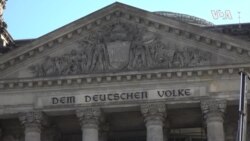ໃນປະເທດ ເຢຍຣະມັນ, ບັນດາຜູ້ອອກນະໂຍບາຍທັງຫຼາຍແມ່ນກຳລັງ ລໍຖ້າຜົນທີ່ອອກມາ ຂອງການເລືອກຕັ້ງປະທານາທິບໍດີ ສະຫະລັດ ດ້ວຍການເຊື່ອວ່າ ມັນຈະມີຜົນຕາມມາທີ່ສຳຄັນ ສຳລັບປະເທດດັ່ງກ່າວ ແລະ ສຳລັບ ຢູໂຣບ. ນັກຂ່າວວີໂອເອ ເຈຄັອບ ຣັສໂຊລ ມີລາຍງານນີ້ຈາກນະ ຄອນຫຼວງ ເບີລິນ, ເຊິ່ງ ພຸດທະສອນ ຈະນຳລາຍລະອຽດມາສະເໜີທ່ານໃນອັນດັບຕໍ່ໄປ.
ໃນ ເຢຍຣະມັນ, ຫຼາຍຄົນຮູ້ສຶກວ່າເດີມພັນທັງຫຼາຍໃນການເລືອກຕັ້ງ ສະຫະລັດ ແມ່ນສູງຫຼາຍຢູ່ທີ່ນີ້ກວ່າປະເທດອື່ນໆໃນ ຢູໂຣບ.
ປະເທດທີ່ມີເສດຖະກິດໃຫຍ່ທີ່ສຸດຂອງ ຢູໂຣບ ດັ່ງກ່າວມີກອງກຳລັງ ສະຫະລັດ 36,000 ຄົນປະ ຈຳການຢູ່ ແລະ ມີການຄ້າຂາຍມູນຄ່າ 200 ຕື້ໂດລາຕໍ່ປີ, ເຂົາເຈົ້າແມ່ນຄູ່ຮ່ວມການຄ້າທີ່ໃຫຍ່ທີ່ສຸດຂອງ ອາເມຣິກາ ໃນ ຢູໂຣບ.
ແຕ່ສາຍພົວພັນທີ່ໃກ້ຊິດກັນໃນປະຫວັດສາດລະຫວ່າງ ສອງປະເທດທີ່ວ່ານັ້ນໄດ້ ຢຸດນິ້ງ ນັບຕັ້ງແຕ່່ທ່ານ ທຣຳ ໄດ້ເລີ່ມກ່າວຫາ ເຢຍຣະມັນ ກ່ຽວກັບ ການບໍ່ຈ່າຍຄ່າປ້ອງກັນປະເທດໃຫ້ອົງການ NATO. ນັກອອກນະໂຍບາຍ ເຢຍຣະມັນ ບາງຄົນໃນປັດຈຸບັນນີ້ແມ່ນເປັນຫ່ວງ ກ່ຽວກັບ ອະນາ ຄົດຂອງສາຍພົວພັນຂ້າມມະຫາສະໝຸດແອັດແລນຕິກດັ່ງກ່າວ.
ທ່ານ ທັອມມາສ ໄຄຼນ໌ ບຣັອກຮອຟ ຈາກກອງທຶນ ມາຊອລ ເຢຍຣະມັນ ໄດ້ ກ່າວວ່າ “ຫົນທາງນີ້ ອາດຈະຫຍຸ້ງຍາກໃນສີ່ປີທີ່ຜ່ານມາກັບ ສະຫະລັດ ທີ່ບໍ່ຄ່ອຍສົນໃຈກັບ ຢູໂຣບ ແຕ່ສົນໃຈ ກ່ຽວກັບ ເລື່ອງອື່ນໆໃນໂລກຫຼາຍກວ່າ ຫຼື ບໍ່ສົນໃຈປານໃດ ກ່ຽວກັບ ການປົກປ້ອງ ແລະ ເປັນຜູ້ພິທັກຄວາມເປັນລະບຽບຂອງສາກົນ. ປະເທດນີ້, ທີ່ຖືກສ້າງຂຶ້ນຕາມລະບຽບທີ່ວ່ານັ້ນ, ແມ່ນກຳລັງພະຍາຍາມທີ່ຈະທຳຄວາມເຂົ້າໃຈ ແລະ ປັບທ່າທີຕາມການປ່ຽນແປງທີ່ວ່ານີ້.”
ການຕັດສິນໃຈຂອງທ່ານ ທຣຳ ທີ່ຈະຫຼຸດຜ່ອນຈຳນວນຂອງກອງກຳລັງ ສະຫະລັດ ທີ່ປະຈຳການໃນ ເຢຍຣະມັນ ໃນປີນີ້ໄດ້ກໍ່ໃຫ້ເກີດຄວາມສົງໄສຫຼາຍກວ່າເກົ່າ ກ່ຽວກັບ ຄຳໝັ້ນສັນຍາໂດຍລວມຂອງ ອາເມຣິກາ ຕໍ່ພັນທະມິດຂອງອົງ ການ NATO.
ທ່ານ ທັອມມາສ ໄຄຼນ໌ ບຣັອກຮອຟ ໄດ້ກ່າວວ່າ “ຖ້າ ອາເມຣິກາ ອອກ ແລະ ບໍ່ມີອົງການ NATO ອີກຕໍ່ໄປ, ຂ້າພະເຈົ້າຈະເຫັນຄວາມຂັດແຍ້ງກັນໃນຢູໂຣບເພີ່ມຂຶ້ນ ແທນທີ່ຈະເປັນສິ່ງກົງກັນຂ້າມ, ທີ່ ຢູໂຣບຈະມາໂຮມກັນ. ສະນັ້ນ, ພວກເຮົາຈະມີທະວີບ ຢູໂຣບ ທີ່ແຕກຫັກ ແລະ ມີການປະເຊີນໜ້າກັນຢ່າງໜັກ.
ການມອງໂລກໃນແງ່ຮ້າຍບໍ່ໄດ້ມີທົ່ວໄປ, ພັກການເມືອງຝ່າຍຂວາ ຊື່ວ່າ ທາງ ເລືອກໃໝ່ເພື່ອ ເຢຍ ຣະມັນ ຫຼື Alternative for Germany ໄດ້ມີຄວາມ ຍິນດີກັບການເຄື່ອນໄຫວຂອງລັດຖະບານທ່ານ ທຣຳ ທີ່ຈະຫຼຸດຜ່ອນການມີໜ້າຂອງກອງທັບ ສະຫະລັດ ໃນປະເທດດັ່ງກ່າວ.
ຄົນອື່ນໆເຫັນມັນເປັນໂອກາດໃໝ່ ບໍ່ວ່າປະທານາທິບໍດີ ອາເມຣິກັນ ຄົນໃໝ່ຈະເປັນໃຜກໍຕາມ.
ທ່ານນາງ ໂຊເຟຍ ເບັກເກີ, ຈາກສະພາພົວພັນຕ່າງປະເທດ ເຢຍຣະມັນ ກ່າວວ່າ “ຂ້າພະເຈົ້າຄິດວ່າມັນບໍ່ແມ່ນຜົນຂອງການທີ່ທ່ານ ທຣຳ ເປັນປະທານາທິບໍດີທີ່ ສະຫະລັດ ໄດ້ກຳນົດບູລິມະສິດອື່ນສຳລັບເຂົາເຈົ້າເອງ ເຊິ່ງນອນຢູ່ໃນຂົງ ເຂດເອເຊຍປາຊິຟິກຍົກຕົວຢ່າງ. ແລະ ຂ້າພະເຈົ້າຄິດວ່າມັນແມ່ນເວລາທີ່ເໝາະສົມທີ່ ຢູໂຣບ ຈະເປັນຜູ້ໃຫຍ່ ແລະ ປົດປ່ອຍເຂົາເຈົ້າເອງຈາກການເພິ່ງ ພາອາໄສ ສະຫະລັດ.”
ບໍ່ວ່າຜົນຈະອອກມາແນວໃດໃນອີກຟາກນຶ່ງຂອງມະຫາສະໝຸດ ແອັດແລນຕິກ ນັ້ນ, ຫຼາຍຄົນຢູ່ທີ່ນີ້ໃນນະຄອນຫຼວງ ເບີລິນ ເຊື່ອວ່າ, ບໍ່ວ່າຈະເກີດຫຍັງຂຶ້ນກໍຕາມ, ການປ່ຽນແປງແມ່ນຈະເກີດຂຶ້ນໃນໄວໆນີ້.
In Germany, policymakers are awaiting the outcome of the US presidential election in the belief that it will have significant consequences for the country and for Europe. Jacob Russell has this report from Berlin.
In Germany, many feel the stakes in the U.S. presidential are higher here than in any other country in Europe.
The EU’s largest economy hosts around 36,000 US troops and at 200-billion dollars a year, it is America’s single largest trade partner in Europe.
But the historically close relationship between the two countries has chilled since Mr. Trump started accusing Germany of not paying its fair share on NATO defense. Some German policymakers are now concerned about the future of the transatlantic alliance.
“This road has been bumpy over the last four years with the U.S. that is less about Europe, more about other things in the world, or less about protecting and being the guardian of the international order. This country, built on that order, is trying to understand and reposition accordingly to these changes.”
Trump’s decision this year to reduce the number of US troops stationed in Germany has sown even greater doubts about America’s overall commitment to the NATO alliance.
“If America leaves and NATO is no more, I would see European frictions rising rather than the opposite, that Europe would come together. So, we will have a very fractious and very confrontation heavy European continent.
The pessimism is not universal. The far-right party Alternative for Germany has welcomed the Trump administration’s move to reduce the U.S. military presence in the country.
Others see new opportunities regardless of who the next American president is.
“I think it’s not a result of the Trump presidency that the US has set other priorities for itself which lie, in the Asia Pacific for example. And I think it is high time that the Europeans grow up and sort of emancipate themselves from that dependency on the United States.”
Whatever the outcome across the Atlantic, many here in Berlin believe that, for better or for worse, change could be on the horizon.





